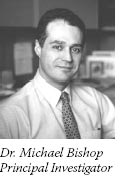
Improving Allogeneic Stem Cell Transplantation
Name of the Trial
Phase I Pilot Study of T-Cell-Depleted Allogeneic Stem Cell Transplantation
after Immunoablative Induction Chemotherapy and Reduced-Intensity Transplantation
Conditioning in Patients with Hematologic Malignancies (NCI-04-C-0116).
See the protocol summary at http://cancer.gov/clinicaltrials/NCI-04-C-0116.
 Principal Investigator
Principal Investigator
Dr. Michael R. Bishop, with Dr. Robert Dean (protocol chair), NCI Center for Cancer Research (CCR)
Why Is This Trial Important?
Some patients with hematologic malignancies (blood or bone-marrow cancers) can be cured with allogeneic stem cell transplantation (ASCT). After preparative chemotherapy, doctors introduce donor stem cells into the patient's bloodstream, where they migrate to bone marrow and help restore the immune system. White blood cells are critical immune-system components. Cytotoxic T cells can kill cells they recognize as foreign, including cancer cells. When this process occurs after ASCT, doctors call it the graft-versus-malignancy effect.
Stem cell donors are usually genetically similar (matched) siblings or unrelated volunteers, but over half of patients lack a matched donor. To address this problem, researchers have studied the use of partially matched (haploidentical) donors. However, ASCT from haploidentical donors often causes serious complications, including graft-versus-host-disease (GVHD), which occurs when donor T cells attack normal tissues.
In this study, researchers are testing whether a modified transplantation regimen may reduce complications while preserving the benefits of haploidentical ASCT. The researchers will use reduced doses of transplant chemotherapy to decrease the risk of serious side effects. Then they will transplant stem cells purged of T cells to lessen GVHD risk. If transplantation is successful, the researchers can give patients donor T cells to enhance the graft-versus-malignancy effect.
Who Can Join This Trial?
The researchers will recruit 6-10 patients aged 18 to 55 diagnosed with hematologic malignancies or related conditions. See the complete list of eligibility criteria at http://cancer.gov/clinicaltrials/NCI-04-C-0116.
Where Is This Trial Taking Place?
The trial is taking place at the NIH Clinical Center in Bethesda, Md.
Contact Information
For more information, contact the NCI Clinical Studies Support Center toll free at 1-888-NCI-1937. The call is confidential.
An archive of "Featured Clinical Trial" columns is available at http://cancer.gov/clinicaltrials/ft-all-featured-trials.
|